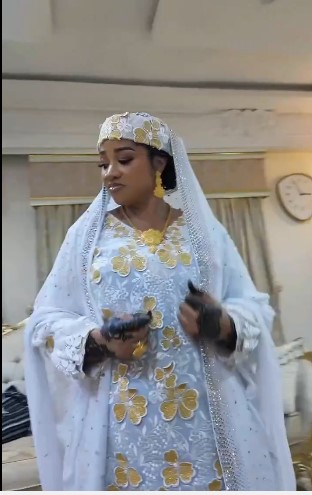Yahaya Bello, the former governor of Kogi State, has recently expanded his family by taking a fourth wife, Hiqma, in a quiet ceremony held in Abuja over the weekend. The wedding, deliberately kept out of the public eye, was attended by a select group of close friends and family members, maintaining a low profile and avoiding media attention. The news of the nuptials remained largely under wraps until Bello’s third wife, Hafiza Yahaya Bello, publicly acknowledged the new addition to their family through a warm welcome message on Instagram. Her post confirmed Hiqma’s new status as Mrs. Hiqma Yahaya Bello, marking her official entry into the family. This event, while private, has generated considerable interest due to Bello’s prominent position as a former governor and a political figure within Nigeria.
The confirmation via social media provided a glimpse into the family’s dynamics and offered a controlled narrative of the event. Hafiza’s message not only welcomed Hiqma but also invoked blessings for the union, emphasizing love, peace, and prosperity within the extended family. This public declaration, while confirming the marriage, also served as a gesture of unity and acceptance within the family, presented in a positive and celebratory tone. The deliberate choice to announce the news through a family member, rather than an official statement, further underlined the private nature of the ceremony. This approach effectively managed the flow of information and allowed the family to control the narrative surrounding this personal event.
Bello’s marital status has been a topic of public discussion in the past, particularly due to his prominent role in Nigerian politics. He served as governor of Kogi State from 2016 to 2023 under the All Progressives Congress (APC) party. His tenure was marked by various policy initiatives and political controversies, but his personal life has also occasionally drawn public attention. The addition of a fourth wife, while permissible under Islamic law, often sparks discussions and differing opinions within Nigerian society, which is characterized by a mix of cultural and religious norms related to marriage. Bello’s decision to have multiple wives reflects his personal beliefs and practices within the context of these diverse societal views.
The media coverage of the event was significantly shaped by the family’s decision to keep the wedding a private affair. Initial reports from various news outlets, including Punch Newspapers, relied on unnamed sources and social media posts for confirmation. The lack of official statements from Bello himself or his representatives contributed to the limited information available to the public. This controlled dissemination of information effectively managed public discourse and allowed the family to dictate the narrative surrounding the wedding. The reliance on social media, particularly Hafiza’s Instagram post, became the primary source for confirming the event and understanding the family’s perspective.
This private wedding underscores the interplay between public figures and their private lives, particularly in the age of social media. While Bello’s political career subjects him to public scrutiny, his decision to keep the wedding private reflects a desire to maintain a boundary between his personal and public spheres. However, the use of social media, while allowing for controlled announcements, also opens the door for public commentary and speculation. The event illustrates the challenges public figures face in managing their privacy in a digitally connected world.
This event also highlights the evolving landscape of media reporting in the digital age. The traditional reliance on press releases and official statements has been increasingly supplemented, and sometimes superseded, by social media posts and informal channels of communication. In Bello’s case, the family’s use of Instagram effectively circumvented traditional media channels and allowed them to directly address the public on their own terms. This shift in information dissemination raises questions about the role of traditional media in verifying information and ensuring accurate reporting in a world increasingly reliant on social media updates. The event highlights the need for media outlets to adapt their strategies and embrace the evolving digital landscape while maintaining journalistic standards of accuracy and verification.


